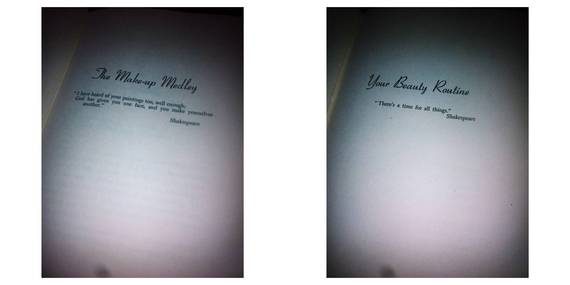
A look at a 1940s tome reveals the uglier side of beauty tropes back when--and freedom from them today--to a millennial beauty nerd.

I think I am what counts as a millennial, which of course means I'm entitled, lazy and self-important. But, seriously, despite all of the negative stereotyping about "my generation," there is something to be said for being a young woman today. Although exacting and impossible beauty standards are still around, I think there is a lot more fun to be had with your "looks" nowadays. I've noticed that often somewhat subversive beauty trends (bushy eyebrows, gappy teeth, mad hair colors) become entirely mainstream, and the vast majority of makeup "rules" seem to be out for the breaking. So when I stumbled across a 1940s tome with the quite simply amazing title of Lessons in Loveliness, I was fascinated to see what I could learn.
The first lesson came early in the book, in the form of some poo advice. "Daily elimination makes for good health. You should defecate at least once a day, or even twice, because if the system does not rid itself of waste matter, trouble breeds." Ugh, way to make me feel weird about learning to be lovely. I thought that this was going to be about lipstick colors and how to get a husband, and instead I'm getting mental images of a colony of germs "breeding" inside me. Not one to be swayed by poo-talk, I plowed on.
I found another fun facet of this book: its distinguishing ability to subtly make you feel bad about yourself. "Don't ever be dismayed by a dateless date-night - it's a swell time to catch your breath and catch up on beauty." Don't worry about being repulsive to all the boys! Make sure you designate a special night to remember to feel bad about your repulsiveness and try to fix it! Lessons in Loveliness really ups the anxiety about your beauty routine, turning what should be fun and innocuous into something regimented and stressful. About! Bathe! Don't fall behind!
Lessons in Loveliness has a fine line in putting girls down: "You've probably heard that everyone has at least one lovely feature which can be played up to minimize the less lovelies. But, sad to say, this isn't always so." Ready for a sweeping statement with no evidence to back it up? While I still feel beauty standards are improbably and (for anyone less brattishly self-assured than a true millennial) damagingly high. But at least they are more varied. Big noses and small noses can be pretty, just in different ways (substitute "noses" for literally any other body part and it works, too). So these sorts of broad generalizations don't really have so much weight with me, or indeed Tyra Banks, pioneer of "ugly-pretty" and therefore genius of the highest order.
There is plenty of advice from this book I was not mad at, at all. One such example: "If your hair's dry...lean heavily on the vegetable oils. Cream in your milk and butter piled high on toast give the extra you need to take you out of the dry-as-dust class." And, even better: "Give your complexion some inside help by increasing the cream, butter and salad oils in your diet." I think I speak for all of us when I say: I wish eating cream improved literally anything about my appearance. The healthy eating tips of the 1940s prove that ignorance truly is bliss.
As a skincare nerd, I found it interesting to read advice from a time when skin-science was so much worse. Surprisingly, some of the advice I actually liked. "Probing and pinching will agitate a widget to a welt" is an extremely bizarre choice of words but I think I get what they're saying. And I am all for renaming blemishes as "widgets." But this fun, cutesy language comes to an abrupt end. "After several hot applications, the head of the infection will come off and you can bathe away the fester." I have honestly never found a description of spot-squeezing more offensive, not least because I can't not now associate it with Uncle Fester. Talking about the uglier side of beauty requires a careful balance between twee and morbid. Instead, this book goes to extremes of both.
Then there were some parts of the book that were so insane they just sounded like ramblings from the person you don't want to sit next to on the bus. "Practice makes deception and you a gay deceiver!" I've read this line over and over and can't quite grasp what the takeaway is supposed to be - the more you tell lies, the happier you will be while lying? And the persistent question, "What does your face say about you?" Well, presumably, since it's my face it says whatever I say. It is actually impossible to imagine a face talking about you behind your back, so whatever allegory was being attempted here is totally lost in a sea of images of bitchy runaway faces (to me, at least).
I'm someone who really, genuinely loves talking about beauty, but make no mistake: There are lots of different ways I hate beauty being talked about (as a competition, as a chore, as "maintenance"). And this book employs a lot of these tropes. While I think Lessons in Loveliness probably spoke more to a social problem at the time with such a didactic, goal-oriented approach to beautifying, it seems almost laughable, and thus relatively harmless today. By no means am I suggesting that the relationship between millenielles (female millennials, keep up) and self-image is uncomplicated or necessarily healthy, at least we can confidently laugh in the face of rules of right and wrong, beauty-wise. Nonetheless, I cannot help but appreciate any book that uses Shakespeare quotes to illustrate a point, particularly when that point is to put on some makeup.